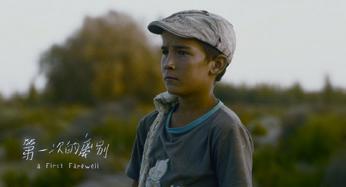Reunion With A Farewell
2020-08-13ByLiQing
By Li Qing
The Tarim Basin in Xinjiang Uygur Autonomous Region, northwest China, is a land of contrasts. Flanked by towering mountains with the arid Taklimakan Desert lying at its heart, it boasts lush greenery and a vast Euphrates poplar forest, the largest and best preserved of its kind in the world.
This is the hometown of Wang Lina, the 32-year-old director whose debut feature film A First Farewell received rave reviews when it was screened in fi lm festivals in 2018 and got an encore last month, when it was shown at home. On July 20, when cinemas reopened on the Chinese mainland after a nearly six-month closure due to the novel coronavirus disease, the award-winning film was released to more applause.
“A First Farewell is a tribute to my hometown and my childhood,” Wang said in a video message. “It was inspired by the essence of life there.”
The title is derived from an eponymous story that the protagonist of the fi lm, Isa Yasan, a Uygur herders young son, reads in a school book. He will eventually learn in his own life what farewell means when he experiences it himself.
Isas mother, who became deaf and mute after a disease, is sent away to a care home and his friend, a lively little girl, also leaves the village for better education.
“We say goodbye and finally grow up,”Wang said, talking about how different people share similar childhood experiences.
A spontaneous story
Wang, who has a masters degree in TV program production, had to do a project in her fi nal year. She chose to make a documentary on how children grow up in her hometown, which despite its remoteness has a place in history. Xinjiang was a hub on the ancient Silk Road and the county of Xayar witnessed the mingling of trade and culture of different countries.
“I began to understand Xinjiang after I left for university,” she told China Newsweek.
Her documentary caught the eye of film director Qin Xiaoyu, who thought it could be developed into a feature fi lm and was willing to put up the investment. So Wang spent a year in a village in Xayar, which provided the school that has a key role in the fi lm. Wang chose her cast from the students as well as villagers for authenticity. None of them are professional actors but their performance has moved viewers.
“I had forgotten my fi rst farewell but their performance reminded me of it in detail, the sorrow and feeling of helplessness at that time,” Su Yue, a viewer in Beijing, told Beijing Review.
To help the children, who had never faced a movie camera before, relax, Wang chose to keep the written script to the minimum, making the dialogue spontaneous, coming directly from the children themselves, and moving.
For instance, there is a scene where the students talk about their dreams in class. Isa says he wants to be a doctor so that he can cure his mother, earn money to support his family and buy a toy.
While the question was scripted, the answers were not. The children said what was in their mind.
Winning laurels
It took nearly two years to shoot the fi lm. The crew also wanted to catch the four distinct seasons in Xinjiang, the local ways of life such as picking cotton and herding sheep, and festivals like Eid al-Adha. All the dialogue is in the Uygur language. Wang said only the local language could fi t the fi lms tone.Seeing the film was a learning experience for some. Su said it gave her the opportunity to learn more about the culture of Xinjiang. “I was overwhelmed by [Isas friends] father singing in the cotton field. I discovered how beautiful Uygur music is,” she said.
Before it was released in China, A First Farewell won the Asian Future Best Film Award at the Tokyo International Film Festival in 2018, was acknowledged the best fi lm by the jury for childrens fi lms at the 69th Berlin International Film Festival, and received the Firebird Award in the Young Cinema category at the 2019 Hong Kong International Film Festival.
“Winning the prizes was encouraging; it made me more convinced that I was heading down the right creative road,” Wang said.
Her aim is to make more films about Chinese ethnic minorities as long as she finds stories that resonate with the audience. She is already researching her second film, which would be on the music of ethnic communities.
The first new release since July 20, A First Farewell topped box-office pickings on the first day, grossing more than 1.5 million yuan($215,496).
“It was an unimaginable achievement for such a small-budget art fi lm,” Qin said.
Some critics have likened A First Farewell to Children of Heaven, Iranian director Majid Majidis 1997 film about a brother and sister from a poor family who want new shoes. They say both revive childhood memories and make the audience think of the relationship between poverty, innocence, kindness and happiness. However, there is also some criticism that the plot is fl at and lacks profundity.
Wang finds childrens stories the most touching. She said she felt particularly moved when she saw Isa feeding an orphaned lamb from a feeding bottle, telling it, “You and I are alike. Our moms cant give us much love, but we should love them.”
“We need to put the adult mindset aside and get into their world to appreciate their specialness,” she said.
Hou Mingke, a professor at Beijing Film Academy, said that it is not easy to make fi lms for children. A good fi lm for children should be developed from their angle instead of propagating adult values.
“It has been many years since I saw a fi lm with a pure childrens perspective and natural performance,” Qin said. “The industry needs more such work.”
